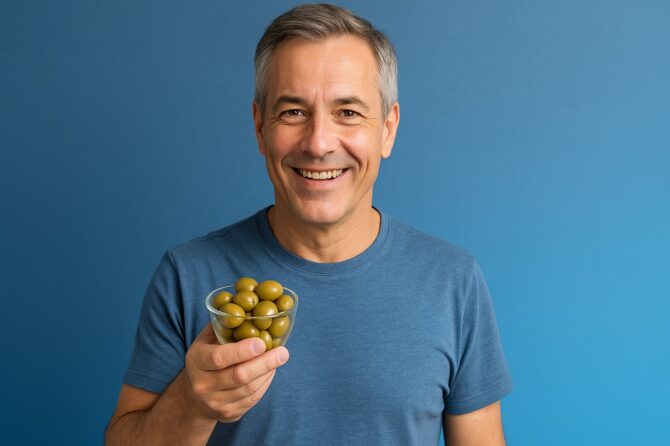
Olives for Middle-Aged Men’s Health
The olive (Olea europaea) has been revered for centuries not just as a culinary staple but also as a medicinal plant with profound health benefits. For middle-aged men, incorporating olives and olive-derived products into the diet can be transformative. Rich in monounsaturated fats, polyphenols, and antioxidants, olives support cardiovascular health, regulate metabolism, and offer targeted protection for prostate and urinary function—areas of concern that often become more prominent with age.
Nutritional Profile of Olives
Olives and olive oil provide a powerhouse of nutrients:
- Healthy fats: Primarily oleic acid, a monounsaturated fat linked to heart and metabolic health.
- Polyphenols: Including hydroxytyrosol, oleuropein, and tyrosol, compounds with strong antioxidant and anti-inflammatory effects.
- Vitamins & minerals: Vitamin E, iron, copper, and calcium, supporting energy levels and overall cellular health.
- Fiber: Aids digestion and helps regulate cholesterol.
Health Benefits of Olives for Middle-Aged Men
1. Cardiovascular Support
As men age, the risk of heart disease increases. Olives, particularly extra virgin olive oil (EVOO), help reduce LDL (bad) cholesterol, raise HDL (good) cholesterol, and improve blood vessel elasticity. Studies suggest that regular olive oil consumption reduces the risk of coronary heart disease—a critical factor in maintaining vitality in midlife.
2. Prostate Health
Polyphenols in olives may have protective effects on prostate tissue by reducing oxidative stress and inflammation. Chronic inflammation is a known factor in prostate enlargement (benign prostatic hyperplasia, BPH) and potentially in prostate cancer. Including olives in the diet provides antioxidants that may help mitigate these risks.
3. Urinary Health
Men in their 40s and 50s frequently experience urinary changes due to prostate enlargement. The anti-inflammatory properties of olive polyphenols may ease urinary flow, reduce nighttime urination, and support a healthier urinary tract.
4. Metabolic Regulation
Middle-aged men often face weight gain, insulin resistance, or pre-diabetes. The oleic acid in olives enhances insulin sensitivity and helps regulate blood sugar, reducing the likelihood of metabolic syndrome.
5. Anti-Aging & Cognitive Protection
Oxidative stress accelerates aging and cognitive decline. Olive antioxidants, particularly hydroxytyrosol, protect brain cells, support memory, and reduce the risk of neurodegenerative conditions such as Alzheimer’s disease—an increasing concern as men enter their 50s and beyond.
6. Sexual Health & Hormonal Balance
Olives may indirectly support testosterone levels by reducing oxidative stress in Leydig cells (the cells responsible for testosterone production). Improved blood circulation and reduced inflammation further enhance sexual health and vitality.
Ingestion Methods
Middle-aged men can incorporate olives into their diet in multiple convenient ways:
- Whole Olives
- Consumed as snacks or in salads.
- Green and black olives both offer benefits, though green olives tend to be higher in polyphenols.
- Choose low-sodium, organic options when possible.
- Olive Oil (Extra Virgin)
- The most concentrated form of olive nutrients.
- Use as salad dressing, drizzle over cooked vegetables, or as a dip for whole-grain bread.
- Recommended intake: 1–2 tablespoons daily.
- Olive Leaf Extract
- Available in capsule or liquid supplement form.
- Known for its potent polyphenolic content, supporting immunity and cardiovascular health.
- Olive Powder or Tea
- Olive leaf tea provides a gentle way to intake antioxidants without excess calories.
- Olive powders (from dehydrated olive fruits or leaves) can be added to smoothies.
Potential Side Effects and Considerations
While olives and olive oil are generally safe, moderation is key:
- Sodium Content: Many processed olives are high in salt—important for men with hypertension.
- Calories: Olive oil is calorie-dense; excessive intake can contribute to weight gain.
- Allergies: Rare, but possible in sensitive individuals.
Conclusion
Olives are more than just a Mediterranean delicacy—they are a functional superfood for middle-aged men. Supporting heart, prostate, urinary, metabolic, and cognitive health, olives deserve to be considered an essential part of a balanced diet. By incorporating olives and olive-based products in thoughtful ways, men can maintain vitality, reduce age-related health risks, and improve their overall quality of life.
Leave a reply

Leave a reply